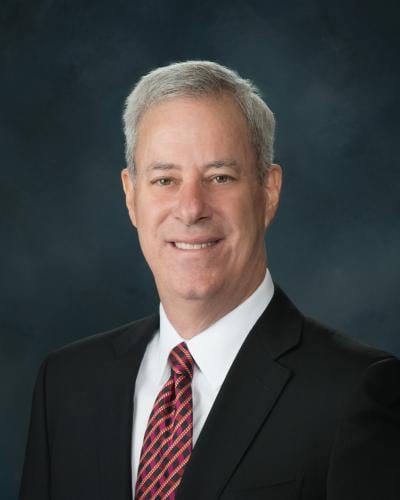At the end of a press conference parsing through the failure of the latest clinical trial for Genentech's early Alzheimer’s disease prospect, Eric Reiman, M.D., likened the decades of efforts to find a solution to the confounding neurodegenerative disease to the moon landing.

“We have launched the era of Alzheimer's prevention research. We are on our way. We are not yet to the moon, but we think we have an opportunity to get there,” he said at the event, hosted by the Banner Alzheimer’s Institute, for which he serves as executive director.
Just like President John F. Kennedy, Alzheimer’s researchers like Reiman have an ambitious goal to achieve as fast as possible, with resources from the public and private sector to make it happen.
But even the best resources couldn’t help crenezumab, the anti-amyloid therapy under development by Roche’s Genentech unit and AC Immune. The treatment has failed the phase 2 API ADAD trial in a group of patients with a genetically caused type of early-onset Alzheimer’s disease. The therapy did not meet either of the main goals, which were assessments of cognitive abilities and episodic memory function.
What followed the release of that news was a rare press conference with Genentech and the other sponsors of the trial, which included the Banner Institute’s Alzheimer’s Prevention Initiative, the Neurosciences Group (GNA) at the University of Antioquia in Colombia, and the National Institute on Aging (NIA) of the National Institutes of Health. The experts parsed over what happened, what they learned and what happens next.
“We did not get the results that we wanted. We learned that we could do such a study. We learned many things about this molecule that we're continuing to look at very closely and we learned that we can accomplish the goal of trying to prevent Alzheimer's disease,” said Rachelle Doody, M.D., Ph.D., global head of neurodegeneration at Genentech.
"We learned many things about this molecule that we're continuing to look at very closely and we learned that we can accomplish the goal of trying to prevent Alzheimer's disease." —Rachelle Doody, M.D., Ph.D., Genentech
After so many failures in the amyloid theory of Alzheimer’s, the question is obvious: Is it time to move on? Doody and her colleagues say no. A lot of hopes had been pinned on addressing the pathology earlier in the course of disease before damage occurs, but this trial seems to have blown a hole in that idea, too.
“As far as the amyloid hypothesis, I think what we have learned progressively has led us to think that our best opportunity to intervene successfully has been to move to earlier stages before damage—potentially irreversible damage—has been done,” said Richard Hodes, M.D., director of the NIA. “This prevention trial is an example. There are those under design and execution which will continue to move to even earlier stages.”
But he also pointed to other ideas for tackling the disease, including combination therapies and other potential targets in the brain. The NIA is currently supporting 69 ongoing pharmacological studies, the majority of which are late-stage efforts that focus on non-amyloid targets. Of the eight late-stage trials, five are amyloid-related, a spokesperson for the agency said.
Hodes also noted that there are some non-pharmacologic ideas that are a “legitimate part of our armamentarium.”
"Once neurons are damaged, it is impossible to recuperate them, so treating early is the only way to preserve the neurons," said AC Immune CEO Andrea Pfeifer, Ph.D., said in an email to Fierce Biotech. She added that they still need to collect more evidence, particularly on a potential biomarker that could signal a treatment effect in some patients. "At AC Immune, we believe these results do not speak against the amyloid hypothesis."
Doody agreed, saying the partners have “learned a great deal” from the study and the collection of failures that have come before it.
“We really need to treat Alzheimer's disease whenever it occurs, and no matter what we do, as human beings, there will probably not be complete prevention in everyone,” Doody acknowledged. “Prevention is very much alive. It needs to be one of our targeted therapeutic approaches, but probably not our only one.”

Reiman said amyloid could be the right target, but crenezumab may simply not be the right drug. The results therefore do not rule out a clinical effect with a different amyloid medication.
“We don't yet know the extent to which we've engaged the target,” Reiman said, noting that there are not great tests available to check—underscoring the continued knowledge gaps in the complex, stubborn disease. “For these and other reasons, the amyloid hypothesis still needs to be tested and that test will necessarily include additional prevention trials in groups just like this one.”
Back to the moonshot
The second question is what happens to Genentech and AC Immune’s crenezumab. This is not the first time the med has failed. Back in 2019, Genentech halted a pair of phase 3 trials after an interim analysis revealed crenezumab was unlikely to meet the main goal of improving the severity of Alzheimer’s. While those studies featured a different group of patients, the results were the same as what we see today.
Doody said it’s just too early to say what the future holds for crenezumab. For instance, they did record differences between treated patients and those in the control arm that need to be understood, although she did not elaborate.
“We still have samples that need to be analyzed. We still have data analysis that needs to be performed. We want to understand everything that we can about the disease,” Doody said. “What did we learn about the molecule? And so it's much too soon to say whether anything more could or should be done with the molecule, the paradigm, and we just have to analyze the data that we have and come to a complete understanding.”

Pfeifer also said it's "too early to say" what crenezumab's future would hold: "We need to see the full analyses."
The trial partners plan to present full results on the failed trial at the Alzheimer's Association International Conference in August.
And there was one final question on the mind as Genentech and the partners reflected on the failure. What does this mean for the star of the Swiss pharma’s Alzheimer’s portfolio, gantenerumab? A critical and much anticipated phase 3 trial readout is expected this year.
Doody said the population being studied with crenezumab was very different compared to the program for gantenerumab. The API ADAD trial had patients with early-onset autosomal dominant Alzheimer’s disease, which is handed down to family members through an altered gene and often surfaces before the age of 65.
The study, interestingly, was conducted in Colombia with patients who had the “Paisa” mutation. The University of Antioquia’s GNA Director Francisco Lopera, M.D., and his team have identified 6,000 people across several families, of which 1,200 carry this specific mutation. They used their connections, built over decades, to enroll the trial’s 252 participants who were cognitively unimpaired and follow them for five to eight years.
Gantenerumab, meanwhile, is being examined in a more straightforward phase 3 program, called GRADUATE 1 and 2, in more than 2,000 patients with the appearance of initial symptoms or early Alzheimer's across more than 30 countries.
“I think we really can't read across from one molecule to another,” Doody said.
So the main questions have been answered, but this moment in Alzheimer’s drug development feels sobering, after more than a yearlong rollercoaster ride that began with the FDA’s controversial accelerated approval of Biogen’s Aduhelm. That drug has essentially been allowed to languish on the market, with Biogen pulling back resources, dropping the price and pivoting messaging to its up-and-coming therapy, lecanemab.
After that much-needed glimmer of hope for patients and their caregivers, we’re back to poring over failed clinical trials, hoping for an Alzheimer’s moonshot.
“It is my personal hope that we might still be able to get there and find an effective prevention therapy within the next few years, depending on the results of some ongoing studies and the readouts,” Reiman concluded.
Editor's Note: This story was updated at 9:13 a.m. ET on June 17, 2022, to include commentary from AC Immune's Andrea Pfeifer, Ph.D.